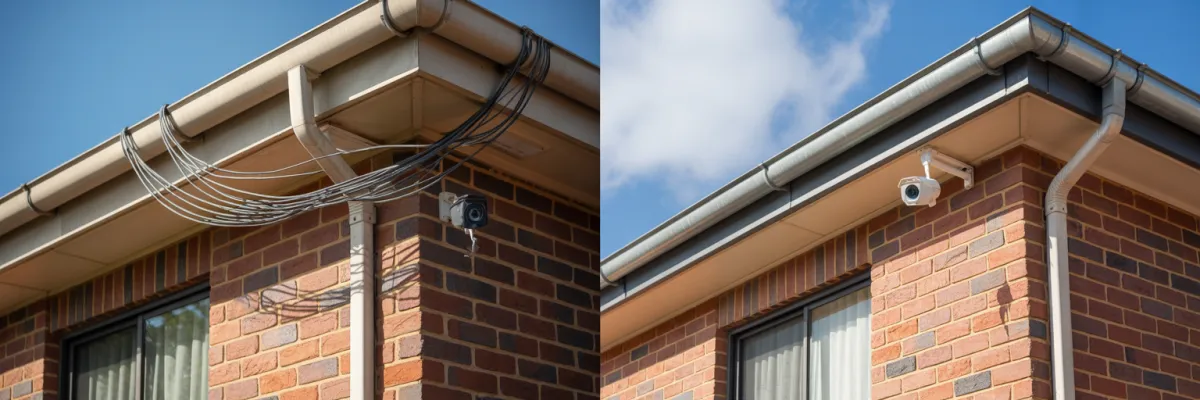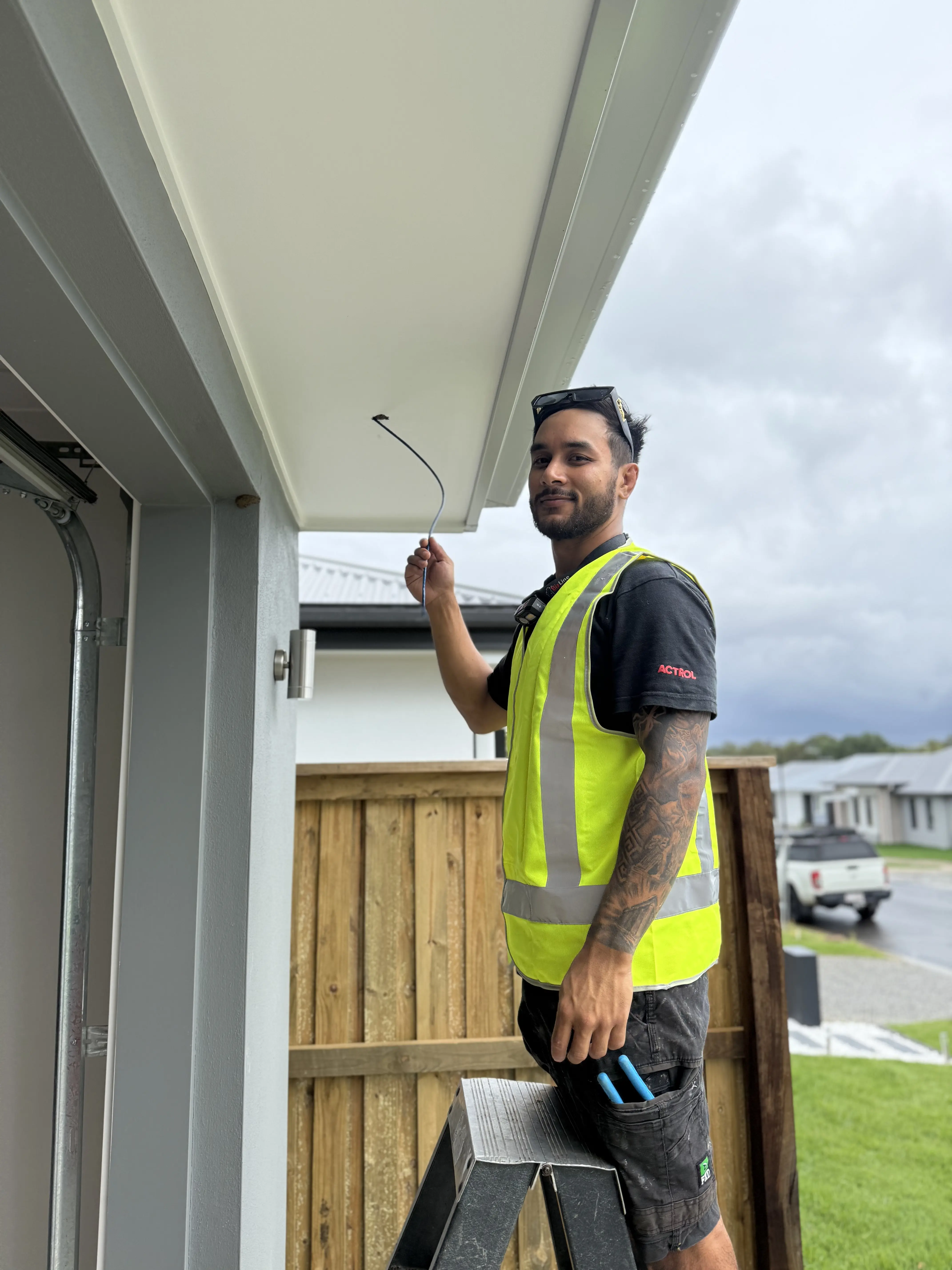
Tamper-Proof Camera Installation for Residential Properties: Complete Protection Guide
What's the point of installing security cameras if an intruder can just knock them down, spray-paint the lens, or cut the wires in seconds?
This is the question keeping Brisbane homeowners awake at night—and it's exactly why tamper-proof camera installation for residential properties has become something you really need to think about, not just a nice-to-have. While standard security cameras give you basic monitoring, they leave your home vulnerable to the very criminals they're supposed to deter.
Tamper-proof cameras aren't just about recording footage—they're about making sure that footage actually exists when you need it most. In this guide, you'll learn what makes a camera installation truly tamper-proof, the specific features Brisbane homes need, and why professional installation makes all the difference.
Why Standard Security Cameras Fail When You Need Them Most
Here's what most people don't realize until it's too late: standard security cameras are really easy to disable.
Criminals know exactly what they're looking at when they see standard residential cameras. Wire cutting takes 3 seconds with wire cutters—most DIY installations leave wiring completely exposed. Lens spray or covering with paint, petroleum jelly, or even a plastic bag takes two seconds if the camera's mounted low enough to reach. Physical destruction of plastic housings is simple with basic tools. WiFi jamming cuts wireless cameras off completely. Power disconnection kills every camera without battery backup.
Last year, a family in Chapel Hill had four cameras. Someone broke in at 2:30am, cut three cables in 30 seconds, spray-painted the fourth lens, then broke in. Total time to disable everything: under a minute. The family lost $8,400 worth of belongings plus the trauma of knowing someone was in their home while they slept.
The cameras were there. They were "working." They just didn't help.
When you have a basic camera system, you feel protected. You go on holiday thinking "it's fine, we've got cameras." But that feeling isn't based on reality—it's based on the idea of cameras, not what they actually do when tested. A camera that fails at the worst possible moment—during a break-in—isn't providing security.

Essential Tamper-Proof Features for Brisbane Homes
Real tamper resistance comes from multiple features working together. Miss even one, and you've got weak points.
📊 STANDARD VS TAMPER-PROOF COMPARISON
IK10 Vandal-Resistant Housing
IK10 is the difference between a camera that can take a beating and one that shatters when hit. The IK rating measures impact resistance—IK10 means protected against 20 joules of impact (like getting hit repeatedly with a 5kg hammer).
Standard plastic housings crack easily. IK10 housings use heavy-duty metal alloys designed to withstand serious impacts while continuing to record. We've seen IK10 cameras hit with hammers during break-in attempts—they got dents but kept recording. That footage led to arrests.
Brisbane's weather matters too. Humidity, intense heat, storms, and UV exposure degrade cheap plastic fast. Metal IK10 housings with IP66/IP67 weather ratings keep moisture out and handle Brisbane conditions year after year.
Tamper Detection and Smart Alerts
Even tough cameras need detection systems. Good tamper detection watches for camera movement, lens coverage, cable disconnection, and housing tampering—then sends instant push notifications to your phone.
The alert arrives while the person's still on your property, letting you call police immediately. This is where professional systems separate from DIY—consumer cameras might have motion detection, but reliable tamper detection that actually works? That's commercial-grade equipment properly configured.
Strategic High Placement
Professional installers mount tamper-proof cameras at 3-4 meters high—requiring serious equipment to reach. At this height with proper 30-45 degree angles, you get clear facial recognition while keeping cameras physically inaccessible. Cameras should also protect each other with overlapping coverage.
Protected Wiring
This is the biggest difference between DIY and professional installations. Professional work means cables run through roof cavities, wall spaces, and metal conduit—completely inaccessible. DIY installations leave wiring exposed along walls where anyone with wire cutters can disable everything in seconds.
Professional Installation vs DIY: Why It Matters
Tamper-proof installation isn't just mounting cameras—it's a different level of complexity that DIY almost always fails at.
Why DIY Fails
Proper placement means 3+ meters high—requiring extension ladders and scaffolding safety. IK10 cameras weigh 2-3kg and need serious mounting brackets drilled into brick or concrete with proper anchors. Cable routing through roof cavities in Brisbane's heat, avoiding electrical wiring, sealing entry points—this requires specialized tools and years of experience.
Technical configuration is another barrier: camera angles, motion detection zones, tamper detection sensitivity, network setup, mobile app access. A couple in North Lakes spent three weekends trying to install a 6-camera system, had a ladder injury, couldn't get tamper detection working, and finally called professionals to redo everything from scratch.
Critical Camera Placement for Brisbane Homes
Every home has vulnerable points. Here's where cameras must go:
Front entry and porch - Cover the entire approach for clear facial recognition, positioned high with proper angles to catch package thieves.
Back doors and sliding doors - Queensland Police data shows back doors are the most common entry point because they're hidden from street view. This needs multiple angles if budget allows.
Side gates and pathways - Burglars love these hidden access points. Mount high on house walls looking along the full path.
Driveway and garage - Cover car break-ins and garage doors with internal house access. Night vision performance matters here.
Ground-floor windows - Any window obscured from street view needs coverage, especially at the back or sides.
Choosing Your System: What Actually Matters
Camera specs can be overwhelming. Here's what matters for Brisbane homes versus marketing hype.
Resolution: 1080p is perfectly fine for residential use—clear facial recognition and license plate reading. 4K costs more, requires more storage, and is usually unnecessary unless covering very large areas. Don't let salespeople convince you 4K is mandatory.
Night Vision: Look for 20-30 meters of infrared night vision. This covers most residential yards. Black-and-white infrared footage with clear details beats grainy color night vision.
Weather Rating: IP66 or IP67 for Brisbane's climate. Protects against intense storms, humidity, heat, and UV exposure. Brisbane summers destroy cheaper cameras in 18 months—proper ratings mean years of reliable operation.

Protecting What Matters Most
Look, we've covered a lot of ground here—from why standard cameras fail to the technical features that actually prevent tampering, from professional installation benefits to choosing the right system for your Brisbane home.
But let's strip away all the technical details for a minute and talk about what this really comes down to.
You're reading this because somewhere in the back of your mind, there's this nagging worry about your family's safety. Maybe you heard about a break-in down the street. Maybe you've had packages stolen. Maybe you just lie awake at night sometimes wondering if your home is really protected.
That anxiety? It's not paranoia. It's your instinct telling you to protect what matters most—your family, your home, the life you've worked hard to build.
The difference between cameras that make you feel safer and cameras that actually make you safer comes down to whether they'll work when someone's actively trying to defeat them. That's what tamper-proof installation is really about—not just recording what happens, but making sure you actually have that recording when you need it.
Professional tamper-proof camera systems aren't cheap, that's true. But neither is the cost of not having proper protection when something happens. And more than the financial cost, there's the emotional cost—the violated feeling of knowing someone was in your home, the guilt of thinking you should've done more, the anxiety that never quite goes away after an incident.
Every Brisbane family we've worked with over the past 10+ years has the same thing in common: they wished they'd done it sooner. Not a single person has said "I regret protecting my home properly." But we've talked to plenty of people who said "I wish I'd done this before the break-in happened."
The good news is you're doing your research now. You're taking this seriously. You're making an informed decision rather than just hoping nothing bad happens.
Whether you choose to work with us or another professional installer, the key is making sure your system is genuinely tamper-proof—not just security cameras, but cameras that will actually work when someone's trying to defeat them. High mounting, protected wiring, tamper detection, solid construction, professional installation. Those features aren't optional extras—they're the difference between real security and false confidence.
Your family deserves to be safe. Your home deserves real protection. And you deserve to sleep through the night without that 2am anxiety about whether you've done enough.
You've done the research. You understand what matters. Now it's time to actually protect your home properly.
Get Your Free Brisbane Property Security Assessment
We'll come to your home, identify your specific vulnerabilities, and show you exactly where tamper-proof cameras should go—with zero obligation and zero pressure.
What You Get: ✓ 45-minute on-site security consultation
✓ Custom protection plan for your property
✓ Same-day detailed quote
✓ Expert advice from licensed professionals
✓ No obligation to proceed
Call us now: +61409809577 / 0409809577


